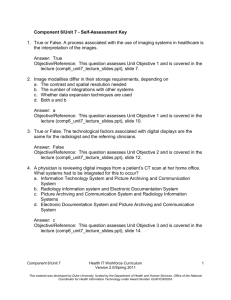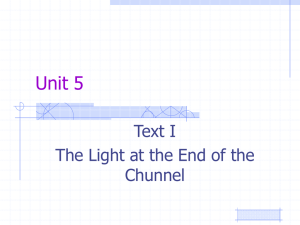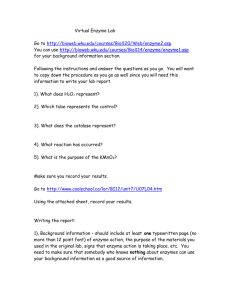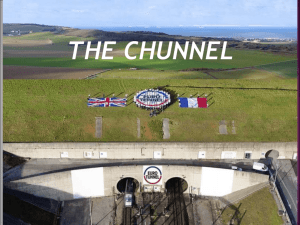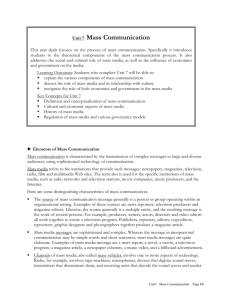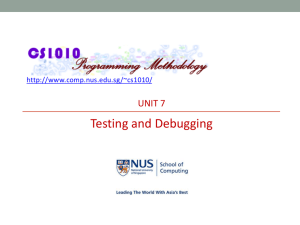II. Clues
advertisement
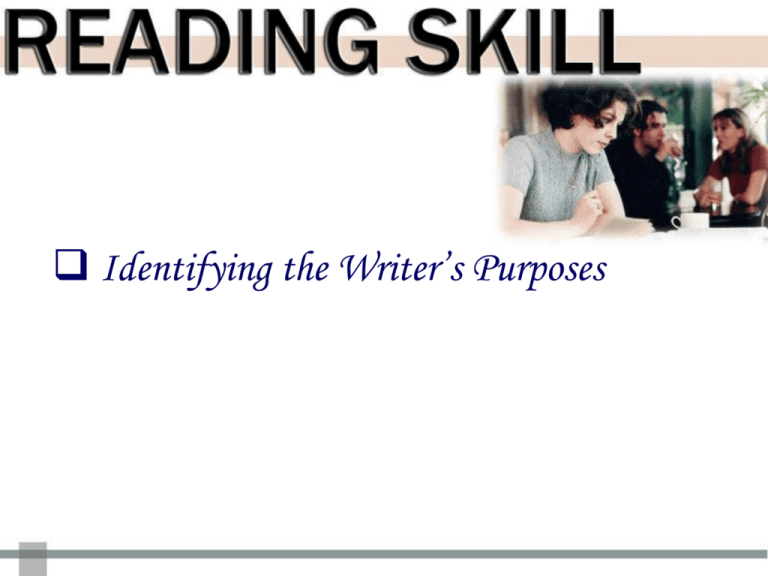
Identifying the Writer’s Purposes BOOK3 Unit7 I. Purposes of Writing To inform—to provide readers with information about a topic; To persuade—to convince readers to believe a certain viewpoint or to take a certain course of action; To entertain—to amuse readers in some way. BOOK3 Unit7 II. Clues Informational Writing: 1. Facts, evidence, no opinions and arguments; 2. Dates, statistics or other figures, and/or quotes; 3. Technical jargon, simple vocabulary and sentence structure. BOOK3 Unit7 II. Clues Persuasive Writing: 1. Emotional appeals: opinions and arguments; 2. Rhetorical questions; 3. Evaluating language (good/bad, right/wrong, horrifying/wonderful, etc.); 4. Judgment language (must, should, had better, etc.). BOOK3 Unit7 Questions to guide your scanning: 1. What is the Chunnel? 2. What numbers do you see in the text? Are they dates, statistics or something else? 3.What quotes do you see in the text? Are they from experts, witnesses, or whom else? 4. Read the first and the last paragraphs. Is the language technical? Light and simple? Or judgmental? BOOK3 Unit7 Keys for Reference: 1.The Chunnel stands for the 31-mile Channel Tunnel between France and England, a word made for Ch(annel) and (T)unnel. 2.The numbers are statistics and dates. 3.There are quotes from one man from London, from a professor of English history, from a newspaper, and from one pessimistic visitor. BOOK3 Unit7 4. The 1st paragraph is simple in diction, but the long sentence is characteristic of journalism. No technical terms. The last paragraph is simple in structure, with an impression of uncertainty on readers. The overwhelming word is “pessimistic”. No technical terms. To sum up, as the text is featured by statistics, date, quotes, and a journalist style, the writer aims to be informational. Question Answering BOOK3 Unit7 Question Answering 1. Where is the money for building the Chunnel from? 2. Will the British feel more European because of the Chunnel? Why or why not? 3. What did Mitterrand mean by saying that passengers will have “ plenty of time for sightseeing”? 4. Why were the several serious efforts to build the Chunnel abandoned? BOOK3 Unit7 Question Answering 1. Where is the money for building the Chunnel from? Private funds. 2. Will the British feel more European because of the Chunnel? Why or why not? No, they won’t because of their respective lack of affection for each other and their history. BOOK3 Unit7 3. What did Mitterrand mean by saying passengers will have “plenty of time for sightseeing”? The trains from Paris travel very slowly the last 68 miles to London. 4. Why were the several serious efforts to build the Chunnel abandoned? The British were too worried about invasion. Translation BOOK3 Unit7 1. No one can ride through the tunnel yet: neither the people who own stock in the company, nor the officers of the 220 banks that provided history's biggest loan, nor the 3,000 journalists trying to imagine three parallel tunnels beneath 100 feet of water and 130 feet of clay. (L6) 任何人都还不能乘车通过隧道: 不论是公司的股票持有 人,还是提供了历史上最大贷款的220家银行的官员们, 或者是3,000名记者,都无一例外。记者们只能尽力想象 水下100英尺、 130英尺的泥土下三条并行的隧道的状况。 BOOK3 Unit7 2. "A whole generation still remembers when only 21 miles stood between Hitler and the conquest of England," says a professor of English history. (L25) 一位英国史教授说, “整整一代人依然记得希特勒曾经只 差21英里就征服英国的那个时刻。” BOOK3 Unit7 3. The British think a sick animal will drag itself through the tunnel and introduce the island nation to new diseases. (L30) 英国人认为带病的动物会穿过海峡隧道将新的疾病带到 这个岛国。 BOOK3 Unit7 4.The company that operates the Chunnel issued press releases accusing the reports of being inaccurate. (L57) 负责隧道工程的公司发布记者招待会,指责报道不正确。 Word Using Chinese to English English to Chinese Word Formation BOOK3 Unit7 1. I. Word Using exclude (L5) v. keep out Compare: include e.g. They excluded people under 16 from entering the net cafe. 他们拒绝接纳十八岁以下的人进入网吧。 BOOK3 Unit7 2. behind schedule (L11) Compare: ahead of schedule 提前 on schedule 按时 Translation Key 1) We finished our job ahead of schedule. 1) 我们提前完成了工作。 2) 我们应按时完成老师布置的作业。 2) We should finish our work on schedule. BOOK3 Unit7 3. bore (L13) v. 1) make a hole (in sth.) using a tool 2) talk or act in a way that makes (sb.) lose interest and become tired e.g. 1) This new model of drilling machine can bore through solid rock ten meters deep. 2) I'm bored with this job. 这台新型钻机能钻透十米厚的坚固岩石。 我对这件工作烦透了。 BOOK3 Unit7 3. bore (L13) n. 3) a person or thing that bores Translation 下雨天外出真是讨厌! Key It's a bore having to go out in this rainy day BOOK3 Unit7 4. attack-proof (L14) adj. What else? weather-proof, sound-proof, shock-proof, fire-proof, radiation-proof, light-proof, dust-proof, water-proof bullet-proof , … BOOK3 Unit7 5. respective (L18) adj. belonging separately to each two or more people or things previously mentioned Compare: respectful, respectable 1) They stood at a ___________distance respectful from the president. 2) The three man were given work according to respective their____________abilities. 3) It is not considered respectable ____________in this country to spit in public. BOOK3 Unit7 II. Chinese to English 从陆路 • by land 简称,缩写 • for short 比预定时间晚 • behind schedule 有共同之处 • have sth. in common 追溯,回溯 • go back to 免得,以防 • in case 只是时间问题而已 • a matter of time BOOK3 Unit7 III. English to Chinese • vacation destination 度假胜地 • the European mainland 欧洲大陆 • the international airline route 国际航线 • faulty alarm 警报系统不完善 • official opening ceremony 官方开幕式 BOOK3 Unit7 IV. Word Formation 1. exclude (L5) A. We can’t __________ exclude the possibility that some warmongers (好战者) will run the risk of starting a new world war. exclusive B. This bathroom is for your ___________use. C. His __________ exclusion from the club hurt him very much. 2. construction (L6) constructive suggestions when we A. They gave us______________ are in trouble. construction B. The new airport is still under_____________. construct a bridge. C. They spent only 3 months to __________ Discussion BOOK3 Unit7 What do you think of the security of the Chunnel?
